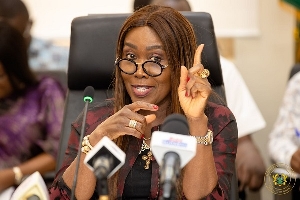Regional News of Thursday, 5 April 2018
Source: ghananewsagency.org
SEND-Ghana educates Bolgatanga communities on corruption
The Social Enterprise Development Foundation of West Africa (SEND – Ghana), a Non-Governmental Organization (NGO) has organised a durbar at Sokabisi, a community within the Bolgatanga Municipality to educate the community members on corruption.
They were also educated on the legal dynamics involved in dealing with corruption and related issues.
The programme, which was sponsored by the United States Agency for International Development (USAID) and implemented by SEND-Ghana, the Ghana Integrity Initiative (GII) and the Ghana Anti-Corruption Coalition (GACC), brought together about 70 community members across Sokabisi and Tanzui in the Bolgatanga Municipality.
The durbar sought to provide a platform for citizens to identify their roles, demand their rights from duty bearers, and to provide the communities the opportunity to discuss the impact of corruption, the need to report corrupt practices.
It was further to introduce existing corruption reporting mechanisms to the participants.
Mr Jonathan Dery, the Upper East Project Officer for SEND-Ghana, observed that “corruption is one of the things killing us not only in Ghana, but also in Africa and across the world. We have not been doing well as a country because the nation’s fight against corruption is below 50 percent.”
He said even though the canker still existed in spite of the efforts to curb it as a nation, “we have not just thrown our hands in despair, what we are doing as a country is to put together the National Anti-Corruption Action Plan to help us address the issues of corruption.”
Mr Dery said to win the fight against corruption, all stakeholders had roles to play under the plan, and insisted that “the fight starts with you and I, it does not start with the President in Accra, it starts right from here.”
He said one of the challenges in the fight against corruption was the unwillingness of citizens to report corrupt practices to the appropriate authorities for redress, and to serve as deterrent to others from engaging in corrupt practices. “We do not report corruption at all even though everybody complains about it,” he observed.
The Project Officer urged the community members to utilise the various avenues; the police, the Commission on Human Rights and Administrative Justice (CHRAJ) and their Assembly members among others to fight the menace.
Mr Abdulai Jaladeen the Upper East Regional Director of CHRAJ on his part, said the advent of the whistle blowers’ Act encouraged people to report acts of corruption as there was an award for people who reported and noted that the identity of whistle blowers was supposed to be concealed by the recipient.
“If you let out the identity and that person is victimised, you are also guilty of an offence and you can be imprisoned for it. Confidentiality is key when we talk of the whistle blower Act,” he said, and assured them of protection by the law.
Mr Jaladeen said “corruption to some extent affects people’s human rights because you are in a community and as a result of one person’s behaviour, a project that is supposed to come to your community, you are deprived of it. Once we report corruption and fight corruption, then we are restoring people’s human rights.”
He said there were about 18 institutions including CHRAJ, the Ghana Police Service, Attorney General, and individuals such as traditional and religious leaders, Members of Parliament Assembly members among others.
He said whistle blowers were entitled to 10 percent of the total sum of monies recouped for the state as a result of their reportage on corrupt practices.
Mr Joseph Makido Azam, the Project Officer of the Advocacy and Legal Advice Centre (ALAC), an NGO, said the Centre was established under the project to receive complaints from victims and witnesses of corrupt practices.
He said the project had two main components; the first was advocacy for legislative change related to accountability and advocating government to resource the mandated institutions like CHRAJ and the National Commission for Civic Education (NCCE) to fight corruption.
Entertainment










